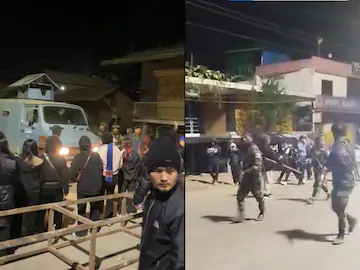It’s Not Meiteis, but Kukis’ Hostility Directed at Forces and Authorities
Power Corridors takes us behind the headlines of Manipur’s ethnic crisis, exposing the grievances of the Kuki-Zo community and their call for dignity, security, and peace. With a journalist’s commitment to truth, the piece challenges divisive narratives while advocating for empathy and constructive dialogue.
BY Navin Upadhyay
Late on Saturday night, I had the opportunity to attend an online discussion as a listener, hosted by the Kuki-Zo community. The event was moderated by Kim Haokip and co-hosted by Professor Kautilya and Oliver, with notable participants including CRPF Battalion Commander Ranvir, author Shiv Kunal Verma, and advocate Vikramjeet Singh.
The three-and-a-half-hour session offered a deep dive into the complexities of the Manipur crisis, where ethnic clashes between the Kuki-Zo and Meitei communities have claimed over 230 lives since May 3, 2023. The discussion shed light on the bitterness and anger stemming from the ongoing conflict while challenging common narratives surrounding the crisis.
Search operations and area domination were conducted by security forces in the fringe and vulnerable areas of hill and valley districts.
Movement of 183 and 01 nos. of vehicles carrying essential items along NH-37 and NH-2 respectively has been ensured. Strict security measures… pic.twitter.com/D766vqfxqh
— Manipur Police (@manipur_police) January 4, 2025
For me, it was a unique experience. I don’t personally know any members of the Kuki-Zo community. My connection with them began when I started writing about the crisis in Manipur, driven by shock and dismay at how the mainstream media, the central government, and Chief Minister Biren Singh have turned a blind eye to this burning issue. In over three decades of my journalism career, this was the first time I participated in such a discussion with strangers. It offered valuable insights into the problem, and I look forward to similar invitations from members of the Meitei community.
To my friends in both communities, I want to make it clear: I am not here to carry anyone’s agenda. I’ve faced sometime bitter accusations thrown my way for the hundreds of articles I’ve written about Manipur, all in an effort to draw national attention to the suffering of its people.
I firmly believe both sides must confront a harsh reality—politicians often thrive on division and polarization, reaping benefits from the violence and hatred that pit communities against each other. Now, more than ever, voices of reason must rise above the chaos, allowing empathy and compassion to take the lead.
As a journalist, I cannot and will not endorse violence from any side. I will continue to raise my voice against it, steadfast in the belief that violence has never resolved any conflict. The path to reconciliation lies in dialogue, understanding, and mutual respect, not in bloodshed.
Key Takeaways from the Discussion
1. Perceptions vs. Reality
Contrary to the popular belief that the Kuki-Zo community is aligned with separatist elements seeking a “greater Christian land” under foreign influence, the speakers expressed a strong sense of belonging to India. Their frustration was directed at the state and central governments, as well as the security forces, rather than the Meitei community.
2. Grievances Against Authorities
The speakers unanimously held Chief Minister Biren Singh and the central government accountable for the prolonged crisis. They alleged a systemic bias, highlighting the pattern of targeting minority and tribal communities as part of the political ideology of the ruling establishment. Several speakers accused security forces of discriminatory behavior, citing incidents where Meitei protesters were treated leniently while Kuki-Zo women were brutalized.
3. Concerns Over Tribal Land and Resources
A recurring fear among the Kuki-Zo speakers was the potential displacement of their community from the hill regions to make way for corporate exploitation. This fear was likened to the experiences of tribals in Chhattisgarh, where forests were reportedly taken over by corporations after displacing local communities.
4. Proposals for Resolution
Several actionable steps were suggested to address the crisis:
o Dispel Fears of Displacement: The central government must reassure the Kuki-Zo community that their homeland and resources are secure.
o Grant Administrative Autonomy: Establishing an autonomous hill council under the Sixth Schedule could address longstanding grievances of discrimination by Meitei-dominated state regimes.
o Sensitize Security Forces: The need for humane handling of protests was emphasized, with speakers citing incidents of severe violence against Kuki-Zo women as unacceptable.
5. Voices of Reconciliation
Despite the anger and bitterness, voices of reason emerged during the discussion. Author Shiv Kumar Verma advocated for unity, urging both communities to coexist as part of a shared nation. He emphasized the importance of bridging divides created by religion and caste. Advocate Vikramjeet Singh echoed the grievances of the Kuki-Zo community while highlighting the complexity of the situation.
A Call for Proactive Measures
The consensus among the speakers was that the crisis has been exacerbated by poor governance and the inability to address deep-rooted mistrust. Replacing Chief Minister Biren Singh with a more acceptable leader and fostering dialogue between the communities could help rebuild trust and diffuse tensions.
While the mainstream narrative often paints the Kuki-Zo and Meitei communities as hostile toward one another, the discussion revealed a different reality: a shared frustration with authorities and a longing for justice, equality, and peace.
It is not too late to heal the wounds of Manipur, but it requires genuine efforts from both the state and central governments to engage with all stakeholders and prioritize reconciliation over division.
(The author could be approached at novinkn@gmail.com)














